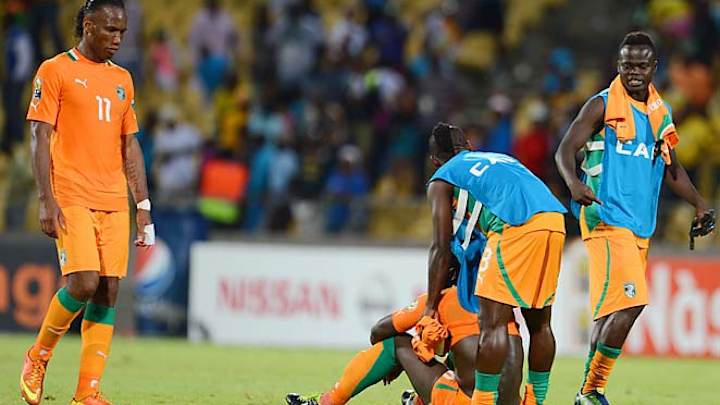Ivory Coast's golden generation falls short at Cup of Nations again

At the final whistle, as Nigeria celebrated in front of the thousands of green-shirted fans who lined the front of the main stand at the Royal Bafokeng Stadium, the pitch was left littered with Ivorians.
Many had fallen where they had been at the end of a 2-1 loss in the Africa Cup of Nations quarterfinals, disappointment overwhelming them. Gervinho had his head in his hands. A little later, as goalkeeper Boubacar Barry walked through the mixed zone, he was visibly weeping. It had happened again. Since being beaten in the final of the Cup of Nations by host Egypt in 2006, Ivory Coast has gone into each subsequent tournament as the favorite. Each time, its so-called golden generation has fallen short; this time, the familiar sense of deflation was inflated by the knowledge that this, realistically, was the golden generation's final chance.
Yet the oldest of them was not slumped. Rather Didier Drogba strode the field, lifting his teammates to their feet, encouraging and consoling. He has been the leader of this side since Egypt, and he remains so. At 34, it would have been easy for him to be overwhelmed by personal concerns, by the recognition that the extraordinary last-ditch success he enjoyed with Chelsea in the Champions League last May will probably not now be repeated at international level, but instead he fulfilled his duties as a captain -- as he always has. It can be hard at times to reconcile the occasionally petulant, tempestuous figure he was at times in a blue shirt with the statesmanlike figure he cuts in orange.
That was clear even seven years ago. If there was a flashpoint, he would always be there, calming things down, pulling younger players away from trouble. Last year, in Equatorial Guinea and Gabon, there must have been times when he felt like punching Gervinho for taking the wrong option yet again and wasting yet another great opportunity, but he remained always calm, always encouraging a player whose confidence is notoriously fragile. When he was left out for the group game against Tunisia this year, he didn't sulk but was noticeably involved form the sidelines, racing over to join the celebrations when Gervinho put Ivory Coast ahead.
And that's without mentioning what he has done for his country off the pitch, trying to reconcile the two sides in his country's civil war. During qualifying for the 2006 World Cup, Drogba made a point after each game of leading prayers for peace. As a result the team became a rare symbol of unity, supported both by the government-controlled south and the rebel-held north. He and other senior players also wrote letters to senior politicians calling for talks aimed at ending the conflict. A treaty was signed in 2007 that, by naming Guillaume Soro, who had led the rebels, as the prime minister was effectively an uneasy power-sharing agreement.
At Drogba's instigation, Ivory Coast played their Cup of Nations qualifier against Madagascar in June 2007, not in the usual venue of Abidjan, in the south, but in Bouake in the north. Rebel troops provided security, while government troops sat in the stand to provide support. As a gesture of solidarity, it could hardly have been bettered.
And yet for all that he has done, he carries a burden. With 10 minutes of the 2006 final remaining, he wasted a sitter. He then missed his penalty in the shootout. He missed a penalty with 20 minutes remaining in the final against Zambia last year.
Given everything else he has done it would be absurd to be critical, and yet those moments must haunt him. He has scored in four FA Cup finals; he's too diplomatic to say so, but he would surely swap one of those goals for a strike in a Cup of Nations final.
"It's over," Drogba said. "We now look ahead to the World Cup, with or without me."
That is an ominous hint of a future without him, a world that is surely not too far away. Will he really be able to drag his weary bones to Morocco in two years for yet another final shot at glory? The consequences go beyond merely the loss of one of the finest center forwards in the world. Yaya Toure may now be the best player in the side, but Drogba remains its emotional heart.
It was he who led the fight back in Rustenburg after a first half with which Ivory Coast had been largely outplayed and had fallen behind as Emmanuel Emenike's crashing free kick swerved past the tentative punch of Barry.
It was Drogba who was fouled by the goal line, Drogba who dinked the free kick to the back post for Cheick Tiote to head in. Drogba who kept urging his team forward. Toure, after a typically impressive group stage, was far quieter, suppressed by the energy and discipline of Nigeria's two midfield holders, John Obi Mikel and Ogenyi Onazi.
The second half was far more even but, with 12 minutes remaining, Nigeria's Sunday Mba surged through two challenges and saw his shot glance in off Sol Bamba, the game winner.
"It's heartbreaking," the center back said. "We were the strong favorite, but unfortunately we didn't manage to do what we wanted to do, to win this competition. The start of the second half was very good, we've scored an equalizer, but for some reason we didn't manage to make more goals and that's the big disappointment."
Drogba had said before the tournament that he was "tired" of always being the favorite and never winning. It's a feeling he may have to carry forever. Perhaps he will be back in two years, but as lightning flashed over the hills around the stadium, this felt like the end for the golden generation.

An accomplished author of multiple books, Jonathan Wilson is one of the world’s preeminent minds on soccer tactics and history.